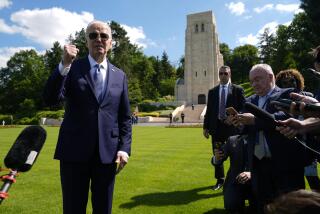Opinion: I have recurring memory lapses. Is it dementia?

Ever since I had a stroke five years ago, I have worried about dementia. I remember a task, then immediately forget about it. Water is poured, then left. Rooms are entered, then I can’t remember why. Pills are taken. Or are they?
In a “60 Minutes” segment a while back, a researcher explained the science of losing your mind. She had been studying high-functioning nonagenarians in California for years. The brain scans in her “90+ Study” might show evidence of trouble — bright swaths of red and yellow that indicate plaque and tangle-like tissues, well-known harbingers of dementia — and yet the participants may never show symptoms of decline. A neuro mystery.
I’m 62, not 92. My brain had been through its own disasters. Was something worse coming?
The president’s enemies and the uninformed combine his recall issues with stereotypes to create a false narrative of intellectual impairment.
Actually, my stroke wasn’t a disabling catastrophe. Initially I couldn’t talk, but a miracle drug flushed out the blockage almost immediately and my brain began to recover in just days. I got my voice back within a week and I began putting sentences and paragraphs back together shortly after that. My doctors were pretty sure I wouldn’t be able to resume writing professionally, but I did. I even recorded a portion of the audio version of my memoir a year after the stroke, which, given what I’d been through, was perhaps more meaningful to me than writing it. It seemed I was out of the woods.
But there were still these memory glitches, almost daily. How could I write a publishable essay but not remember that I had, seconds earlier, taken the half-and-half out for my coffee? I began to discount, then hide the mistakes from my wife, including the times I left the burner on or the car running.
I decided to take a cognitive test, worrying about the possibility of progression. I knew some of what to expect. In 2014 I had successful spinal cancer surgery, and afterward my doctors wanted me to answer the test questions. I protested then because I viewed it as an indignity: I’ve just been through cancer surgery and you want me to do what? Eventually I gave in.
My legs no longer worked well but my arms did. My doctor said there were two ways to get better: heal and adapt. She suggested I get a hand-bike.
Now I wanted the test, even though the results might mean I would lose my driver’s license, or worse. The therapist assured me they would be kept private, shared only with my doctors. Still, I hesitated, canceling once.
The three-hour test wasn’t fun. Participants in the “90+ Study” took a similar test annually as part of their protocol, and I saw myself in the “60 Minutes” footage of a failing and frustrated 90-year-old. It was humbling. He wasn’t missing broad areas of recall, but more nuanced things: He couldn’t repeat back three words he had been told 40 seconds earlier, and he failed to recall number sequences. Researchers gave him a second shot at some of the questions, as the person administering my test did with me. No, nothing, I had to tell them. No, I can’t remember.
The report was 14 pages long. When it showed up in my inbox, I ignored it for several days. I wondered if I really wanted to know what they found. What if keeping my lapses in the background — a kind of strategic denial, I know — was critical to my high-functioning self?
It was scary, but I finally read the exhaustive report. Dozens of cognitive tasks were graded on a scale from “exceptional low” to “above average.” My scores weren’t great. I was found wanting in “executive function,” a term that refers to the planning and executing of jobs that the brain routinely does. The clinical fellow in psychology who gave me the test made practical suggestions for daily living (such as putting up Post-it notes with reminders) and recommended follow-up appointments with a speech and language therapist and my neurologist.
Maybe this isn’t surprising — I read the report and then I forgot about it. And I didn’t follow up. That was three years ago.
In a few days, my first nonfiction book in 10 years will be published. I started researching it within a few months of seeing my cognitive test report. It includes source notes and a lengthy bibliography of the books I read for research. Because of several family emergencies, I got a late start writing but I met the book deadline, finishing the bulk of it in a three-month window.
And as I prepare for publication, I know I will have moments where I walk into a room and wonder, what am I doing here?
Todd Balf’s new book, “Three Kings: Race, Class and the Barrier-breaking Rivals Who Launched the Modern Olympic Age,” will be published July 2.
More to Read
A cure for the common opinion
Get thought-provoking perspectives with our weekly newsletter.
You may occasionally receive promotional content from the Los Angeles Times.








